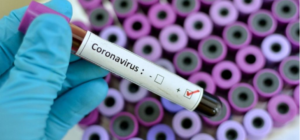FAQS for Restaurants & the Hospitality Industry COVID-19 (Coronavirus)

Can the Coronavirus be spread through food, including refrigerated or frozen food?
According to the CDC “Coronaviruses are generally thought to be spread from person-to-person through respiratory droplets. Currently there is no evidence to support transmission of COVID-19 associated with food.”
How are restaurants responding?
The foodservice industry follows strict local public health guidelines. To meet these guidelines, restaurants have safety protocols and best practices in place, including guidance from ServSafe. The National Restaurant Association also has a fact sheet in English and Spanish with information specific to the industry. We encourage you to download, review and disseminate the fact sheet.
What can we all do?
The CDC suggests that people take the same steps they would to keep from getting the flu: get a flu vaccine, take everyday preventative actions – like washing your hands often – and see a doctor when you are sick.
Both the WHO and OSHA have issued guidance for preparing a workplace for COVID-19 that include tips for preventing the spread of the virus and steps to reduce workers’ risk of exposure. And the CDC recently issued a strategy for implementing mitigation strategies for communities with local transmission.
Where can I find the EPA list of antimicrobial products for use against the novel Coronavirus?
On March 3, the EPA released a list of registered disinfectant products that have qualified under its emerging viral pathogen program. You can find the list here.
Where can I find more information about the Small Business Administration (SBA) disaster assistance loans for impacted businesses?
On March 12, the SBA announced that it will work with state governments to provide targeted, low-interest disaster recovery loans to small businesses severely impacted by the outbreak. You can find out more about these loans and how to access them here.
What is the impact to the supply chain?
It is still unknown if or how the Coronavirus will impact the foodservice supply chain. Many organizations and researchers are monitoring developments and we will keep you apprised to the best of our ability.
What are some proactive measures that restaurants can implement?
This sort of analysis should be done on a case by case basis in consultation with counsel. However, some general notions to consider:
- Space out tables to provide at least 6 feet between each party;
- Limit large parties/reservations;
- Limit dining occupancy to reservations only to control density;
- Provide for a takeout option;
- Implement reduced schedules based on need;
- Provide customers with additional napkins or tissues to use when they cough or sneeze;
- Make sure alcohol-based hand sanitizer is available for customers to use;
- Make antibacterial soap available in bathrooms;
- Exclude employees who are showing flu-like symptoms from the operation until they are symptom free;
- Follow quarantine guidelines as set forth by the CDC;
- Encourage employees to wash hands with soap and water for at least 20 seconds or use an alcohol based hand sanitizer that contains 60- 95% alcohol when water and soap are not available;
- Encourage employees to avoid touching eyes, nose, and mouth with unwashed hands;
- Tell employees to stay home if sick;
- Clean and disinfect objects and surfaces that have been touched (tables, chairs, counters, doorknobs, toilets, phones, etc.);
- Tell employees to inform you if they have partaken in any international travel in the last month or if they intend to travel internationally in the coming weeks or months;
- Tell employees to inform you if they have been near or around an individual who is now subject to quarantine or who has contracted COVID-19;
- If an employee has any concerns regarding ability to work on premises due to a weakened immune system or because the employee is compromised or more susceptible to the virus have the employee contact the Human Resources Department;
- Any requests by employees to work remotely should be directed to the Human Resources Department;
- Consult with your insurance broker to determine if you have coverage for business disruption.
If you have any questions regarding any of the foregoing, payment of wages for exempt employees, payment of wages for non-exempt employees, layoffs, EDD submissions by employees for unemployment benefits due to layoffs or reduced hours, paid sick leave, other leave laws, and how to handle situations that involve employee’s needing time off to deal with their children’s school closures, etc., please contact us.

